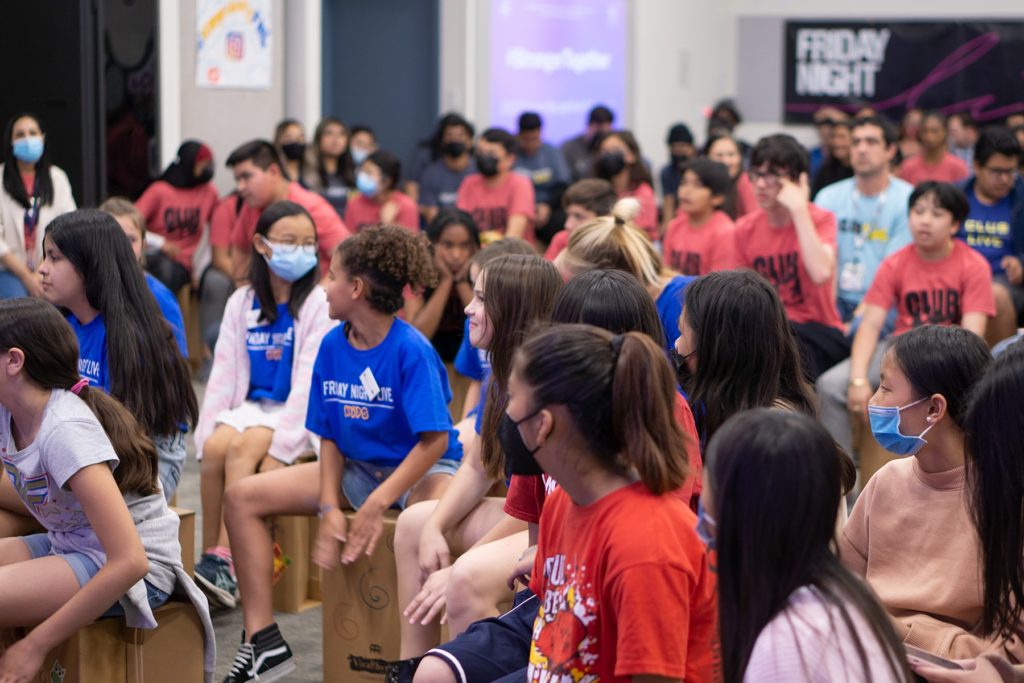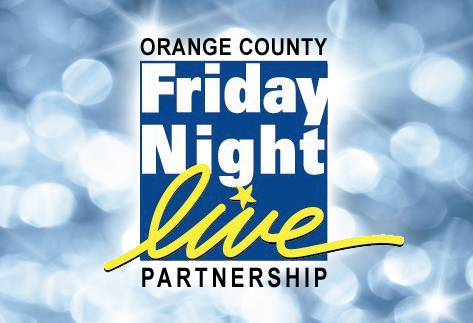
Friday Night Live clubs participate in an interactive keynote presentation during the OCFNLP Chapter Recognition Event, which was held on May 13 at the Orange County Department of Education.
The Orange County Friday Night Live Partnership turns 30 this year, and to put that in perspective, consider that the first students to take part in the program are now in their mid-40s — and some may have high schoolers of their own.
If you’re not familiar with OCFNLP, it encourages young people to take the lead on alcohol and drug prevention campaigns and community service initiatives. Along the way, they learn leadership, communication, team-building and problem-solving skills.

There are three levels to the program: Friday Night Live chapters are for high-school-age youth, Club Live groups are for middle schoolers, and Friday Night Live Kids chapters are for the upper-elementary grades. With guidance from advisors, many of these groups function like clubs on school campuses, while others are affiliated with community organizations.
Established in 1992, OCFNLP is led by the Orange County Department of Education with funding from the OC Health Care Agency’s Alcohol and Drug Education and Prevention Team, or ADEPT. This year, the agency is investing an additional $100,000 to expand the program so that it can serve even more schools and youth-serving organizations.
In celebration of its 30th year, here are a few facts you might not know about the Orange County Friday Night Live Partnership.
***
Local Friday Night Live programs are based on a state model that was created in 1984.
The California Friday Night Live Partnership, which was established at the state level in 1984, provides training, technical assistance and support to local programs in more than 50 counties, including ours.
While its mission has evolved over the years — more on that in a moment — the state program is committed to the idea that a youth-driven framework that’s inclusive, comprehensive and based on current research can improve the lives of young people and their communities.
The program was originally intended to prevent traffic fatalities involving young people.
Friday Night Live started out as a way to provide safe environments for young people on Friday nights — hence the name. Why Fridays? Data showed that’s when the highest number of youth-related traffic fatalities occurred.
Over the years, FNL shifted to a youth development model focused primarily on alcohol and drug prevention strategies, and levels were added for elementary and middle school students. But the original name stuck.
“It is really focused on providing opportunities for students to make meaningful contributions to their schools and communities,” OCDE Youth Development Programs Coordinator Elke Petras says. “Specifically, our focus is on substance-use prevention, which is tied to that origin, but we want to provide the opportunity for students to work on initiatives that they think are important and that affect their peers.”
Friday Night Live and Club Live groups vary greatly. So do their activities and objectives.
The whole idea behind the OC Friday Night Live Partnership is that students are empowered to make decisions that best serve their schools and communities. As such, each group is going to look and work a little different.
In 2019, student leaders from one Friday Night Live chapter held a town hall-style meeting to talk about the dangers of underage drinking. A year earlier, seven schools took part in an observational study to document the effects of distracted driving in their communities.
FNL members have met with alcohol retailers to talk about best practices for reducing alcohol sales to minors and staged teen party simulations to reveal the realities of underage drinking to parents. They’ve also held toy drives, worked in food kitchens, organized Red Ribbon Week events and promoted mental health education. Petras says some students recently solicited family recipes from classmates to create and distribute cookbooks, which also featured advice on how to talk to kids about drugs and alcohol.
Campus programs draw students from all backgrounds and academic levels.
Shannon Bennett is entering her 10th year as the FNL advisor at Santiago High School in the Garden Grove Unified School District. She says she’s frequently asked if there’s a GPA requirement or other criteria for joining Friday Night Live.
“I always remind them that this club is open to anyone at any time, and there’s a leader in everybody,” she says. “Sometimes kids aren’t sure that they see themselves in that way. We tell them to give it a chance.”
“The club fits any kind of personality, any kind of grade level, any kind of academic ability,” adds Bennett. “It’s a character club, a social club. It’s about doing good in our community, and the kids have so much fun.”
Any school or community organization can start a Friday Night Live chapter.
There are currently 25 FNL chapters across the county, down from 33 prior to the start of the pandemic. But any school or community group can start one with a little help from OCDE.
Those who are interested in launching a new Friday Night Live, Club Live or Friday Night Live Kids chapter are encouraged to reach out directly to Petras. “I’ll give them an overview of the programs, and they can decide if it’s a good fit that supports what they need,” she says.
If there’s already a program at your school that has similar objectives, Petras says it can work with OCFNLP — and receive all the benefits and support that comes with that partnership.
Bennett, winner of OCFNLP’s Advisor Excellence Award in 2018, strongly encourages schools to start their own programs, citing a decade of success stories at Santiago High. In fact, she was recently contacted by a group of former students who fondly recalled their time in FNL and the friendships that came out of it.
“I have so much to say about it,” Bennett says, “because I have literally watched it change kids’ lives for the better.”
For more information about the Orange County Friday Night Live Partnership, contact Elke Petras, coordinator of Youth Development Programs for OCDE, at EPetras@ocde.us or 714-966-4458.
